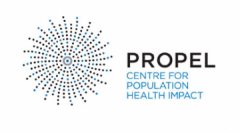The Propel Centre for Population Health Impact in Applied Health Sciences aspires to a Canada that is free from preventable cancers, other chronic diseases and their causes.

A national research program of the Canadian Cancer Society, Propel’s three scientific programs — tobacco control, healthy living and capacity development — leverage collaboration between researchers and policy-makers to solve complex health problems and reduce rates of disease. The Centre’s pioneering survey tools capture rates of tobacco, drug and alcohol use among teenagers and provide governments and communities with information to improve policy and programs.
Recent impacts
Bans on flavoured tobacco products
Teenagers who use menthol cigarettes smoke more cigarettes — an average of 43 per week — than youth who use unflavoured products. Propel evidence helped Nova Scotia, Quebec, Ontario, Alberta and New Brunswick successfully pass flavoured tobacco bans to curb rates of youth smoking.
Championing population health intervention research
One in every two Canadian adults is living with a chronic disease. As secretariat for the Population Health Intervention Research Initiative for Canada (PHIRIC), Propel is increasing our nation’s ability to conduct and use research on the effectiveness of programs and policies that reduce rates of disease and improve the health of Canadians.
Evidence for healthy living policy and programming
Half of all cancers are preventable. Propel’s Cancer Risk Assessment in Youth Survey (CRAYS) is a surveillance tool for tobacco use, eating behaviours and ultraviolet radiation exposure among 14 to 18 year olds. It’s helping advocates for nutrition and tanning bed legislation make stronger cases for laws that will protect younger generations from a future of disease.
Promoting physical literacy
Only 13 per cent of Canadian boys and six per cent of girls meet recommended guidelines for daily physical activity. As an evaluator of national physical activity programs like Build Our Kids’ Success and RBC’s Learn to Play, Propel is working to improve physical literacy and activity among youth, both inside and outside the classroom.
![]()
![]()









